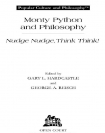Monty Python and Philosophy, Gary Hardcastle [portable ebook reader TXT] 📗

- Author: Gary Hardcastle
Book online «Monty Python and Philosophy, Gary Hardcastle [portable ebook reader TXT] 📗». Author Gary Hardcastle
Once they begin their battle, Arthur promptly chops off the Black Knight’s left arm. “’Tis but a scratch,” claims the Black Knight, refusing to back down. His aggressive masculinity is an absolute component of his ethics, and will not be compromised by inconveniences such as missing limbs or extreme pain. To give in to those would only amount to “crying like a girl.” That’s for “pansies.”
Soon, the Black Knight is a fountain of blood standing on a single leg. Yet he continues to goad Arthur—who watches this spectacle without suffering a scratch—into the breach. “Come here!” the Black Knight yells. “What are you going to do, bleed on me?” Arthur asks sarcastically. “I’m invincible!” replies the Black Knight. “You’re a loony,” replies Arthur, speaking as much to the Black Knight as to the masculine ethics that he struggles to maintain in his defeat. Even without a leg to stand on, he continues to taunt Arthur and Patsy as they cross the bridge and continue their quest: “Running away, eh? You yellow bastard, come back here and take what’s coming to you. I’ll bite your legs off !”
We Have Found a Witch. May We Burn Her?
Another scene opens with flagellating monks in the manner of Ingmar Bergman’s The Seventh Seal. The monks walk purposefully in a line through a village street as Arthur and Patsy arrive to witness Sir Bedevere’s widely-known expertise in science and logic. But Bedevere appears to be known for something else as well.
First, Bedevere is confronted by a group of villagers who have dressed up a young woman to look like a stereotypical witch. Bedevere examines the woman and takes testimony about her alleged mischief from the villagers. One, played by John Cleese, explains that this witch turned him into a newt. “She turned you into a newt?” Bedevere asks, and there follows a long, puzzled silence. “I got better,” Cleese’s villager sheepishly explains. Bedevere’s logical gymnastics are no match for these villagers’ stories, but he grants that the woman may yet be a witch. To know for sure, he explains, she must be weighed. She may be a witch only if she is made of wood and weighs the same as a duck (because both ducks and wood float on water). Impressed by this faulty logic, the villagers follow Bedevere to his grand scales (much like the scales of justice) to weigh the young woman against a duck. If the scales balance, the young woman must be made of wood, and is therefore . . . a witch.
But it is not Bedevere’s logical loops that impress King Arthur. Once again (remember the Black Knight) Arthur is easily impressed. As he observes the wise Bedevere in action, the homo-erotic subtext to this story of a witch burning is suddenly no longer subtextual. The male bonding begins as Arthur invites Bedevere to join the quest for the Holy Grail; Bedevere drops to his knees and grovels in submission, and Arthur unsheathes his very large sword which he taps on Bedevere’s shoulders, thus dubbing him Sir Bedevere. As these bonds fall into place, however, the angry mob, eager for a witch burning, has dragged the young woman off screen and, despite the fact that she seems to weigh more than a duck, are surely up to no good. But these realities are of little concern for Arthur and Bedevere, now infatuated with each other, their shared sense of masculine ethics, and their shared quest for the Holy Grail.
We Have but One Punishment. . . . You Must Tie Her Down on the Bed and Spank Her
Arthurian legend and sadomasochism? Consider Sir Galahad the Chaste, played by Michael Palin. On his journey, he is lured into the Castle Anthrax by a Grail-shaped beacon and confronted with the unspeakable terror of a bevy of most-willing and unchaperoned beauties. Here the film addresses the theme of the individual’s path—the crux of all the Grail romances. Seeking individuality, these stories suggest, has a greater reward than following the desires of others. So imagine Galahad the Chaste’s predicament.
Slowly, he warms to the idea. The women have requested that Galahad punish each and every one of them by tying them to a bed, then spanking, and then engaging in oral sex, that epitome of male sexual desire. But just as Palin is being led off to the bathing area to prepare for his tasks, he is intercepted by Sir Launcelot, played by John Cleese, who arrives at the castle with his knights to save Galahad from such unholy temptation. After all, on this most holy of quests, Launcelot counsels, Galahad must maintain his devotion to the search and the common good. The idea is an old one in Arthurian legend and in masculine ethics as well: males engaged in their duties must not become “disengaged” on account of such temptations.49 As early as the Old Testament, in which Eve tempts Adam with an apple, women are portrayed as temptresses. Women, rebirth, and the feminine are often associated with the primitive and ancient symbol of the snake to indicate some aspect of deceit, such as having a “forked-tongue.” The feminine is also associated with mystery, unpredictability and, therefore, danger.50
Castle Anthrax is as deadly as its name. It is full of poisonous, deceitful women eager to tempt the righteous and good men of the world, throwing up false grail-shaped beacons to lure unsuspecting, innocent men to their lair. Again, the image of the snake is a clear parallel as a poisonous and sly hunter who uses





Comments (0)